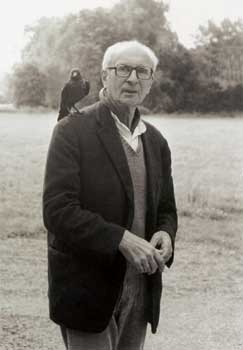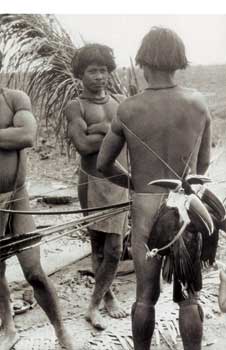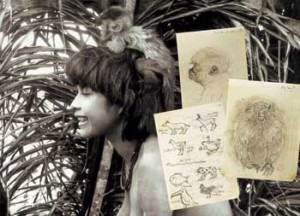
REPRODUCTION FROM THE BOOK CLAUDE LÉVI-STRAUSS: L’HOMME AU REGARD ÉLOIGNÉLévi-Strauss at his home in France, where he took refuge toward the end of his lifeREPRODUCTION FROM THE BOOK CLAUDE LÉVI-STRAUSS: L’HOMME AU REGARD ÉLOIGNÉ
Anthropology has a short history, having arisen, essentially, in 1870. It is based on four or five leading names, such as Tylor, Frazer, Malinowski, Boas and the recently deceased Claude Lévi-Strauss, whose demise has made the tropics sadder. “Of all the members of this group, he is probably this century’s leading anthropologist; his merit was that he synthesized the different traditions of various national schools of thought in his work”, says anthropologist Eduardo Viveiros de Castro, from the Museu Nacional museum. He would certainly not have appreciated being the posthumous ‘victim’ of so many eulogies as witnessed in the month of his death. His wish was that his work be discussed, with propriety, as a live entity that explains the natives of the Americas as no other person had been able to do before him. “This is the Lévi-Strauss rejection, Parisian style: structuralism cannot be a “line of thought” or a “school of thought”, nor can it be associated with a specific author. Structure and structuring is the modus operandi of the spirit itself, and therefore his works cannot be anything other than structural. In his opinion, all the authors of true works base themselves on structuralism”, points out USP anthropologist Beatriz Perrone-Moisés. In her opinion, “he deserves to be acknowledged as one of the century’s greatest thinkers, whose ideas are very much alive because they continue generating knowledge and suggesting multiple exploration possibilities”.
Born in Brussels on November 28, 1908, Lévi-Strauss studied law and philosophy in Paris. Today, he is considered the creator of structural anthropology and one of the greatest thinkers of the 20th century. He was 26 years old when he came to Brazil in 1935, as part of the so-called French Mission that took part in the creation of the University of São Paulo/ USP. During his few years in Brazil, he traveled throughout the country and conducted ethnological research on the Kadiwéu and Nambikwara indigenous people, which led to his celebrated book, Tristes Tropiques [literally Sad Tropics, but translated into English as A World on the Wane]. Unable to return to France because of the war, Lévi-Strauss went to the United States, where he taught at New York’s New School for Social Research. This episode consolidated his thinking and changed his life. From being a Marxist philosophy apprentice he became a brilliant ethnologist. Back in France, he became full professor of anthropology at the Collège de France, in Paris, where he wrote most of his greatest books, which include The Elementary Structures of Kinship, (written during his stay in the United States), The Savage Mind, Structural Anthropology, and Mythologiques. A biographical summary such as this one seems very skimpy for someone who lived to be 100 years old. What is most impressive is that these possibilities are open to a wide range of research fields: philosophy, sociology, history, history of religion, literature, psychoanalysis, art, etc. His contributions affected and will probably affect all these fields of knowledge for many years to come, which might explain their longevity.
His major contribution, however, is basically very simple: there is no absolute global civilization because the idea of civilization itself implies the coexistence of cultures that provide maximum diversity amongst them, points out Marcio Goldman, an anthropologist from the Museu Nacional. The best feature of civilization is precisely this “coalition” of cultures in which each preserves its originality. Nobody attacked racism more violently than Lévi-Strauss (as Pierre Bourdieu pointed out, says Viveiros de Castro) and perhaps very few thinkers have taught us to be humble. It is impossible not to see in this vision the traces of a young 17-year old passionate about politics, a leftist activist who devoured Marx’s books and joined socialist organizations. “My optimism about Marx has never waned and I rarely study a topic related to sociology or ethnology without reviving my reflections when reading The Eighteenth Brumaire of Louis Napoleon or A Critique of Political Economy”, Lévi-Strauss liked to say. For him, “Marx, Freud and geology are my three mistresses”, because, he would continue, these fields of knowledge were never satisfied with the phenomenic appearance of the discourse of those being analyzed, the mysteries of the world, the pragmatic nature of economic relations. “Marx preached that social science is not built on the level of events, nor is physics built on the basis of data on sensitivity”, he wrote in Tristes Tropiques.

REPRODUCTION FROM THE BOOK CLAUDE LÉVI-STRAUSS: L’HOMME AU REGARD ÉLOIGNÉThe anthropologist collected material and images during his expeditionsREPRODUCTION FROM THE BOOK CLAUDE LÉVI-STRAUSS: L’HOMME AU REGARD ÉLOIGNÉ
The works of Lévi-Strauss, says Viveiros de Castro, synthesized the tradition of the school of sociology of Durkheim and Mauss, the American cultural anthropology of Boas – with whom he maintained contact during his exile in the United States (“he learned a lot from this German-American anthropological school”, the researcher explains) – as well as British anthropology which, in turn, was influenced by the French tradition. “All these factors kept him from being a typical French thinker; this is coupled with the fact that he lived a substantial part of his life out of France (in Brazil and in the United States). He knew how to combine these different influences in his work”, adds Viveiros de Castro. During his wanderings around the world, Lévi-Strauss was a thinker with an open mind to the influences of other disciplines such as linguistics, responsible, for example, for the synthesis of anthropology with the studies of Jakobson, among others. “He was also the one who opened the gates of anthropology to cutting-edge sciences, such as cybernetics – the original name of information technology – connecting it with new disciplines such systems theory and information theory. This lent anthropology a new profile, which led to a new opening for the exact sciences, bringing them and the humanities together. He had a talent for mathematics, as well as for the arts, and was thus able to synthesize various disciplines”, adds Viveiros de Castro.
Above all, the anthropologist points out, Lévi-Strauss had a privileged mind; he was a classic thinker in the broadest sense. “Something akin to the temperament of Bach: major formal strictness coupled with major melodic creativity. He was the last anthropologist to know everything about indigenous populations – he had a prodigious memory.” Strangely enough, his influence on anthropology, where time, paradoxically, always seems relative, was short: roughly 20 years, from the 1950s to 1968, when, according to Viveiros de Castro, structuralism went into hibernation. His work has recently started being re-evaluated. “This short-lasting influence does not mean that he did not play an important role, nor does the fact that he was laconic about his political life and personally conservative mean that his political role was neither fundamental nor advanced.” The anthropologist points out that what was only restricted to the academic world is visibly formulated in the book Race and History, written in 1952, at the request of Unesco, to fight racism, and which, in his opinion, was a ferocious attack on ethnocentrism. “With his intellectual power, he brings the issue of the indigenous peoples of the Americas to Western eyes, something which had never been done before. Colonialism could no longer walk the streets as it used to. He did more for the cause of the indigenous populations of the Americas than all his critics together ever did, even though he was not a fiery preacher. He was a devastating critic of western arrogance. He put the indigenous peoples into the present, so that they ceased to be relics of the past. They were no longer allegories and became our contemporaries. This is worth much more than any analysis”, the anthropologist adds. In the researcher’s opinion, we look at American Indians nowadays and in them we see the future that we might have had and no longer will, because of the ethnocentric arrogance criticized by Lévi-Strauss and verified by him in ecological issues. “He was the thinker who changed the terms under which anthropology was developed.”
After the horrors of the Second World War, it made sense for Lévi-Strauss to admire primitive people, because it was among them that he found a fraternal spirit. At the same time, he said, it was impossible to forget the concept of diversities and therefore it was unacceptable to view other societies using our own society as a parameter and to herald our superiority over the society of the so-called “primitive people”. Furthermore, it was necessary to acknowledge the power of these people, capable of developing specific wisdom that motivated them to resist any changes in their structure, which was based on the preservation of nature, on matrimonial rules aimed at maintaining fertility and on political principles that abolished any kind of non-unanimous decisions. “These were the years of Totemism Today and The Savage Mind in the 1960s, a pause in his anthropological work on kinships, social organization issues and social relationship dramas. Lévi-Strauss refocuses his interest on issues pertaining to cosmology, classification, mythology. In his opinion, the savage mind is the mind not yet domesticated by science with the aim of producing a yield, i.e., a mind not yet made rational in an economic-scientific sense”, analyzes Viveiros de Castro. “He insists that the reasoning of indigenous peoples is neither confusing and obscure, nor lost in the mists of magic and of primitive participation. On the contrary – it is reasoning obsessed with order, distinction, classification. According to Lévi-Strauss, there is no lack of continuity between modern science and savage science and in the future both will converge towards the same point. In short, he destroys the misleading views of Europeans about primitive people; he dissolves ethnocentrism”. Opening up to the “other” is not a European trait, as the natural tendency of Europeans is to consider the European group the best example of humankind and view other human groups as less perfect examples of that humankind. “By addressing issues on the reciprocal perceptions of alterity mobilized by the European invasion and conquest of the Americas, Lévi-Strauss insists on the radical difference between what he refers to as ‘openness to the other’, a characteristic of the native American reasoning, and the fanatical closing up of the Europeans (political, philosophical esthetic) when faced with the social and natural alterity offered by the New World.”

REPRODUCTION FROM THE BOOK CLAUDE LÉVI-STRAUSS: L’HOMME AU REGARD ÉLOIGNÉPhotos of indigenous peoples taken by Lévi-Strauss during his tripsREPRODUCTION FROM THE BOOK CLAUDE LÉVI-STRAUSS: L’HOMME AU REGARD ÉLOIGNÉ
“The indigenous peoples of the Americas elected differences as a principle. Lévi-Strauss clarifies this philosophy by analyzing the myths that narrate the adventures of two characters, the myth of ‘twins’, that allow him to show how what he calls the bipartite ideology of the functions of indigenous peoples. The lynx in The Story of Lynx is one of these members of mythical duos, constantly opposed to the coyote”, points out Beatriz Perrone-Moisés. “Differences are the principle of the philosophy and ethics of America’s indigenous peoples. The bipartite ideology of the indigenous peoples is expressed in the myths of the twins and highlights openness towards the other. Lévi-Strauss points out that the creation-related myths of all the Americas included non-indigenous peoples relatively quickly. He says that this can only be explained if we admit that the place of the white people had already been demarcated, though was empty, in thought systems based on a dichotomy principle obliged to unfold the terms at each stage; thus, the creation of the indigenous peoples by the demiurge dictated that he create the non-indigenous peoples as well.” That is, adds the researcher, the place of the other, reserved for alterity and conceived as a foundation, as being always there; in this sense, the philosophy of the indigenous peoples of the Americas is “open to otherness”.
According to Viveiros de Castro, the “other” is not only the thinkable but also the indispensable. “In this sense, Brazil was a definitive rite of passage in the construction of Lévi-Strauss’ future professional identity. Prior to 1935, he had been a high-school philosophy teacher. After 1938, he became an Americanist doing research on the indigenous peoples of Brazil. His work and his career owe a lot to the Brazilian experience”, says anthropologist Fernanda Arêas Peixoto, from USP. The first phase of his production is based on raw materials obtained in Brazil, especially the article on the Bororo and the thesis on the Nambikwara, published in 1948. His later works, although comprised of ethnographic information from various regions of the Americas, also benefited from Brazilian ethnography, which acts as a kind of starting point from which the work projects itself. We could say that the spiraling work of Lévi-Strauss contains a permanent movement that is translated into the incorporation of new objects and issues and into a systematic return to former results, to the beginning, the Bororo, to the Nambikwara”, the anthropologist writes in her article Lévi-Strauss no Brasil [Lévi-Strauss in Brazil]. “It is no exaggeration to say that the early years of the University of São Paulo and the presence of foreign professors in São Paulo in the 1930s still reverberate in the features of the social sciences within the context of São Paulo. The same thing seems to occur with ethnology, the flourishing of which was in a way hampered by the preponderance of sociology. Paradoxically, ethnology was introduced to USP’s courses by the one person who would become USP’s most prominent name: Lévi-Strauss.”
“He was the most prominent exponent of anthropology in general, of anthropology ever since it was created. Lévi-Strauss was the great successor, in a certain way, of Sartre in French thought and, concurrently, was Sartre’s antagonist. Sartre’s influence was enormous until the 1960s. He was a man who, especially towards the end of his life, literally took over a political party, especially after the war in Algeria. Moreover, Sartre, after the war, and especially in the late 1950s and early 1960s, was a man who had been deeply influenced by a political view. The pre-war Sartre was entirely different. However, Lévi-Strauss took an entirely different path. He was a socialist to begin with and, moreover, he never joined a political party. His attitude towards his contemporaries was seen by many apolitical, as if he were abstaining from embracing a political stand”, says anthropologist Manuela Carneiro da Cunha. “In fact, in my opinion, his work has extremely centered political implications. He was an environmentalist long before ecology came into being and he was way ahead of his time, for example, as his advocacy of animal rights shows. He does not refer to this in this manner precisely because he doesn’t bother with labels, but he introduced this as a very important theme. It is important to keep in mind that he views anthropology and the birth of anthropology as directly linked to the idea of what Rousseau called compassion. What is compassion? The possibility of putting oneself in the place of the other. This is compassion. However, who is this other? Is it simply a human being? Or is it also, for example, an animal? Or is it those who at the time he started writing were called ‘people with no writing’ or ‘primitive people’? So what is his political implication? It isn’t only ecology and the animal advocacy – it is advocating human unity. His policy is, in a broad sense, the redemption of the equality of human thought. In other words, human thought is the same; no matter where, it functions in the same manner- which doesn’t mean that the contents are the same.”
Book
CAIXETA DE QUEIROZ, R. (ed.). Lévi-Strauss: leituras brasileiras. Editora UFMG, 2008.